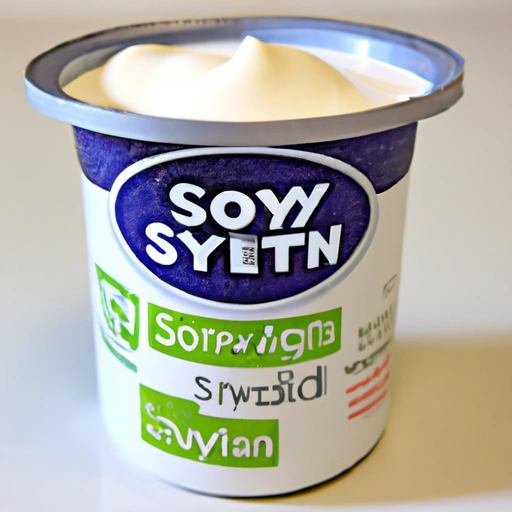Soy Yogurt
Description

Soy yogurt is a dairy-free alternative to traditional yogurt made from cow's milk. It is produced by the fermentation of soy milk with specific cultures, typically Lactobacillus bulgaricus and Streptococcus thermophilus. The result is a creamy, tangy yogurt that retains many of the nutritional benefits of soy while being suitable for vegans and those with lactose intolerance. Soy yogurt can vary in texture and flavor depending on production methods and added ingredients, such as sweeteners or fruit flavors.
Common uses
Soy yogurt is commonly used as a direct substitute for dairy yogurt. It can be enjoyed plain, sweetened, or flavored with fruit and spices. Due to its creamy texture, it is also used in dressings, dips, and as a base for smoothies. In baking, soy yogurt can act as a moisture-adder and a binder, making it a versatile ingredient for vegan recipes.
Nutritional value
Calories
Per 100 grams, soy yogurt contains approximately 94 calories (393 kJ).
Protein
Soy yogurt provides about 3.9 grams of protein per 100 grams.
Fat
The fat content in soy yogurt is about 2.1 grams per 100 grams.
Carbohydrates
Soy yogurt contains roughly 15.2 grams of carbohydrates per 100 grams.
Vitamins
Soy yogurt can be a source of Vitamin B12, especially when fortified, as well as Vitamin D and other B vitamins.
Minerals
Key minerals found in soy yogurt include calcium, often added through fortification, magnesium, and potassium.
Health benefits
As a part of a balanced diet, soy yogurt can contribute to heart health due to its low saturated fat content. The probiotics present in fermented soy yogurt can aid in maintaining a healthy gut microbiome, and the plant-based protein is beneficial for muscle repair and growth. Soy yogurt is also often rich in isoflavones, compounds associated with a reduced risk of certain cancers.
Potential risks
While soy yogurt is a healthful food, individuals with soy allergies should avoid it. Additionally, some brands may include added sugars, which should be consumed in moderation.
Common recipes
Soy yogurt is used in a variety of recipes, including vegan parfaits, tzatziki sauce, and as a sour cream substitute in soups and stews.
Cooking methods
While it can be consumed directly from the container, soy yogurt can also be incorporated into cooked dishes. Care should be taken to add it at the end of the cooking process to prevent curdling.
Pairing with other ingredients
Soy yogurt pairs well with fresh fruits, granola, honey, nuts, and can complement spicy dishes by providing a cooling effect.
Summary
Soy yogurt is a nutritious and versatile food ingredient that caters to a wide audience, from those following a vegan lifestyle to individuals seeking lactose-free options. Its culinary applications are extensive, and its health benefits are notable, making it a valuable addition to any diet.